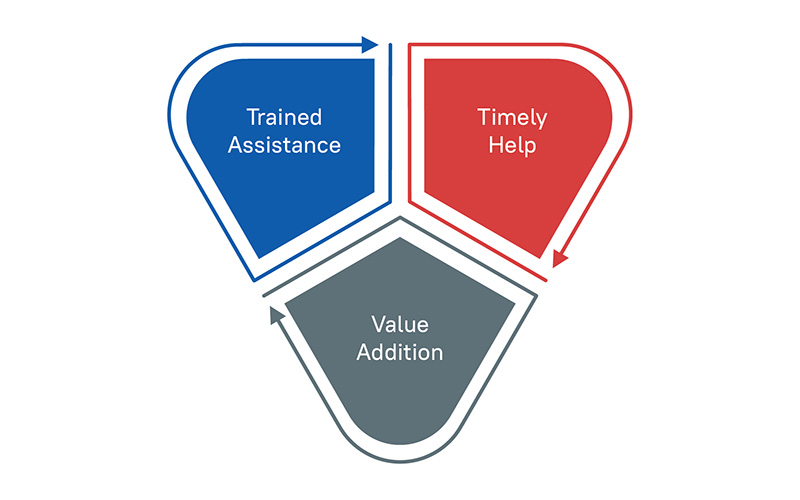.svg)


According to an article in the Harvard Business Review, around 60–90% of strategic business plans never come to fruition. One of the reasons for this is the lack of time employees dedicate to strategic work that can help put plans into action to help ensure efforts are aligned with business growth. Existing initiatives within an organization are constantly competing for employee time, and this can take time away from strategic work.
Align resources and efforts with growth.
The role played by the virtual assistant is an important one. It involves:
- Helping in-house staff with their tasks and sharing the overall workload so that they can focus on important tasks such as strategy creation.
- Contributing directly to business development by collaborating with clients when needed and responding to them, especially when key in-house resources are unable to.
- Helping free-up key in-house resources from high-volume tasks. This can help them carve out the time needed to shift their focus to high-value business development tasks such as investment strategy creation.
Most in-house personnel, whether they are leaders or working actively on tasks, need to multi-task and may have limited bandwidth to contribute toward developing a successful new strategy.
Due to high volumes of deliverables and work demands, in-house personnel may not always have the time to focus on critical business development, planning, and activities. Trained and reliable help can be hard to obtain, and one of the biggest challenges businesses often face is the lack of properly trained assistance. To a significant extent, this issue can be resolved by enlisting the help of trained virtual assistants.
Here is a 5-step guide to help your business benefit from the expertise of a virtual assistant:

#1. Identify Business Requirements
Business operations require assistance at different levels. This can include identifying areas within the business that need assistance, managing customer communications, helping in-house staff with project management, and lending a hand with critical requirements such as travel bookings, email communication, etc.
#2. Outline Tasks Where Prompt Execution is Needed
Be sure to identify which tasks require prompt execution. These can include communication and collaboration between team members, ensuring coordination between multiple teams, responding to customer requirements, and helping share the workload when needed. Virtual assistant services can cover these tasks in a reliable way without impacting existing workloads or client deliverables. A trained virtual assistant can also take care of business errands such as making quick purchases and booking travel and lodging arrangements.
#3. Verify Business Support Areas
Support areas within a business can include the need for online research, documentation, and storage of records, with the appropriate use of software tools and applications. A trained virtual assistant can help with project management, scheduling tasks, sharing the workload, and providing operational assistance.
#4. Request a Demo.
A demo or a risk-free consultation can help businesses outline the extent of help needed and the areas where assistance is needed. A demo of virtual assistant services can help businesses understand the actual extent of the help they require, combined with the level of trained assistance and support they can expect from the service provider. This can help foster better understanding and help use this type of assistance in an optimal way.
#5. Review Security Policy
A secure non-disclosure agreement can help address any concerns regarding the safety of sensitive data. Before hiring a virtual assistant, be sure to draft an agreement that clearly outlines security expectations and requirements. This allows all stakeholders to collaborate more freely without worrying about uncertainty or confusion over any expectations.
Next Steps
- Learn more about the benefits of a professionally managed virtual assistant and how this type of additional support can help boost your business’s profitability.
- Email us at sales@analytix.com or call us at 781.503.9000 today.
- Follow our blog for industry trends and the latest updates.
- Engage with us on LinkedIn and Twitter.
Related articles.

.svg)
.svg)
A Smart Tax-Saving Combo: SEP IRA Contributions + Capital Loss Harvesting

.svg)
.svg)
10 Benefits of Custom Software Development in 2025

.svg)
.svg)




